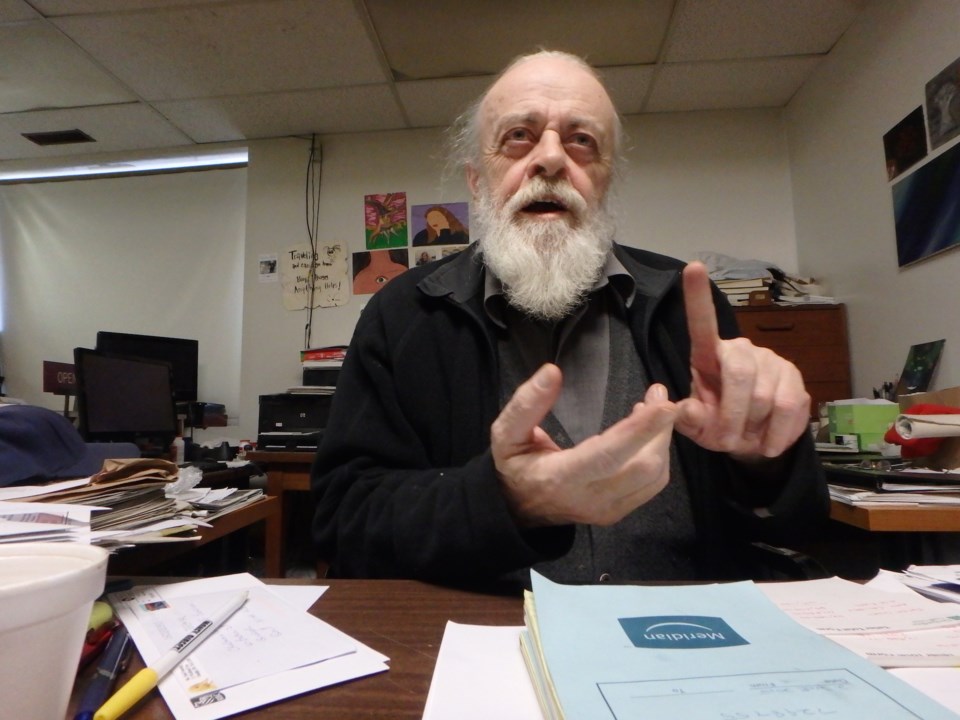In the street culture of downtown Guelph everyone knows where you’re going when you say you’re going to “40.” The homeless and struggling want to keep going to 40 Baker Street, and 40 Baker Street wants to keep its doors open.
For the past few months, pale yellow building in the heart of the city has been asking its supporters to reach for their wallets.
For many years, the programs housed at the location have helped Guelph’s marginalized residents get something to eat, and get out of the cold.
The programs, some beginning in the early 1980s, have been offered out of other locations in the past. Now they are under a single roof on Baker Street.
The campaign 200 for 40 is a grassroots funding effort for an organization that is something of a black sheep in the city’s social services family.
Within the walls of 40 Baker Street a host of programs give “friends” (not clients) of the centre a sense of hope and community.
Ed Pickersgill is the centre’s coordinator. Fresh Start Housing Centre, Our Place Youth Centre, Our Place Youth Supper Club, Baker Street Art Gallery, and Making Room for Us, are all run out of here.
A place to get a meal or a new pair of socks, a place to explore art-making and friendship building, 40 attracts a small crowd every day. But unlike similar services in Guelph, its programs receive no funding from any level of government, Pickersgill said.
He and others associated with the place have a vision, and a stubborn belief that community services can actually be financially supported by the community in a direct way.
The people these services serve are more important than the bureaucratic rules and regulations that constrain other organizations, he said.
About $40,000, less than half of the organization’s roughly $100,000 in annual operational expenses, comes from United Way Guelph Wellington Dufferin.
The United Way money goes to pay for 40 Baker Street’s food. All other expenses, including rent, utilities, Internet costs, and salaries have been funded through community-based donations. Bringing in those donations is an ongoing struggle, Pickersgill said.
The campaign 200 for 40 seeks to build a grassroots sponsor group made up of 200 people who are willing to give $20 each month to ensure 40 Baker Street survives. Pickersgill said the $4,000 per month collected would cover operational costs.
So far, it appears there is a willingness to support the funding model. To date, 114 donors have signed on, all but a few of those are individuals. District 18 of the Ontario Secondary School Teachers Federation, and the Guelph and District Labour Council have also contributed. The money is already being used to support programs.
“If we find these 200 people this will give us a substantial community-based support that will keep all of these things that we do here at 40 Baker Street going,” Pickersgill said. If successful, the campaign would net $48,000 a year.
“If we’re successful, we will still be here next year, and we will be looking to do the campaign again next year,” he said. There is more to the campaign than money, he added.
“For me, what is more important is that right now we have 114 people who know what we do and are putting monthly money in to support us continuing to do what we do,” he said. “It is a real community base there. These are real people giving real support to what we do.”
The 200 for 40 Facebook group, a closed group, lists all the donors.
“We’re kind of an outside-the-box organization, and this is an alternative funding model,” he added. “We need the money. An alternative funding model is possible, and that is being demonstrated actively.”
The campaign has relied heavily on social media to generate support, and has not used conventional advertising or mainstream media to get the word out, he said.
“This gives people a chance to acknowledge what we are doing and why we are doing it, and why it is important to have something that is not government funded, something that is a classic non-governmental, non-professional organization, classic grassroots, handling a client population that we think of more as our friends and acquaintances than our clients,” he said.
“It is about having a safe, non-judgmental, community-based place for people to come,” he added. “You don’t have to have an appointment here. We help whoever shows up, but the people who show up are people who have been alienated, people with mental health problems, people with addictions, people who are homeless. When they come in, they are able to be here in safety.”
Crystal Cote, 30, comes to 40 for support. She said she is going through a difficult time in her life, separated from her family, unemployed and near homeless.
“They have helped me look for a place to live,” she said. “And there is dinner at 4:30, and I come in for that. Mostly it is about having somewhere to come, having people to talk to, and people showing you how to get the help you need. I feel supported by lots of nice friendly people.”
To donate to 200 for 40, visit 40 Baker Street in downtown Guelph, or connect via email at [email protected].
